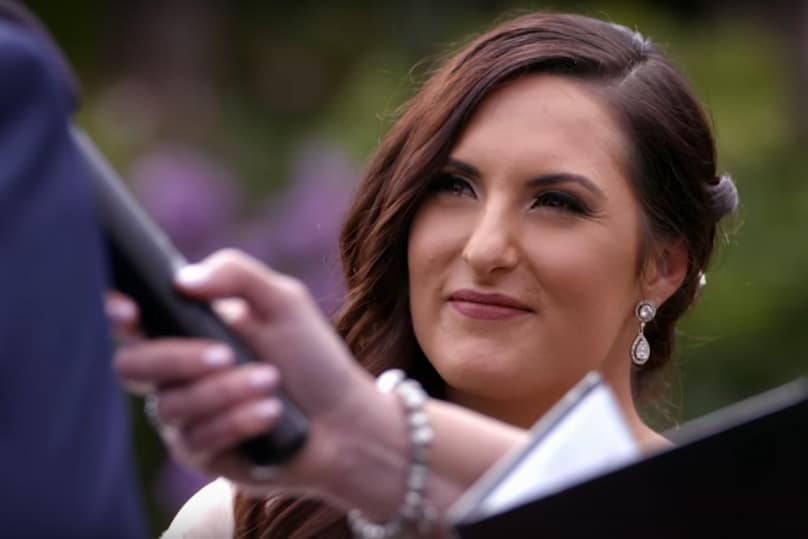
Bless me Father, for I have sinned. I’ve wasted way too much time watching Married At First Sight. I’m sorry. I won’t do it again. Not until next season anyway.
Look, I never planned to watch it; we were just flicking through the channels during a My Kitchen Rules ad break, and there it was. And within one episode, our entire household was hooked. Ok, my husband wasn’t that interested. But my in-laws, who we live with, certainly were. And while I could only ever watch snippets of the show between getting our two kids fed and in bed, watching MAFS soon became part of our evening ritual. We had favourite couples. We loved to hate the villains. And when season four ended last week, I was a little bit sad that it was all over so soon.
In case you’ve never heard of or seen the show, Married at First Sight follows a group of couples that agree to “marry” when they first meet, based on the premise that three experts have matched them with a spouse they’re most compatible with. Thankfully, unlike in international versions of the show, Australian participants don’t undergo a legally binding marriage (the Australian Marriage Act requires at least one month and one day notification before two people can get married), but they do take part in a commitment ceremony with a wedding celebrant, go on a honeymoon, and commit to a marriage-like union for the duration of the experiment. Throughout the season they get to know each other, each other’s families, and at the end they decide if they want to continue their relationship or go their separate ways.
For the record, I don’t actually think watching this show is a sin (happy to stand corrected, though – it is Holy Week after all, and I’m due to go to Confession anyway). But, let’s face it; given that it’s a show that is based on everything a Catholic marriage isn’t or at least shouldn’t be, Married at First Sight isn’t exactly wholesome family viewing.
When the promos for the first season aired back in 2015, a petition calling for it to be axed attracted over 15,000 signatures. I remember feeling disgusted and saddened that the meaning of marriage had become so diluted that television producers thought fit to have strangers “give it a go” for a few weeks, for the sake of public entertainment. So much for “until death do us part”.

Yet here I am, two years later, having followed an entire season for the first time, keen to see the outcome for each couple even though I’d never heard of or met them before. I found myself invested in their journeys, even though I knew that every scene and character I was watching was carefully manufactured. I know “reality television” is still meticulously edited television, and I hated myself for liking what is essentially a dating show with a catchy title.
MAFS had a way of creating fans in unsuspecting people – I came across a golf-loving, 37-year-old father of three and a couple from my local parish with over three decades of marriage under their belt who couldn’t get enough of it. Do you think Susan will give up her city life to live on Sean’s farm? Did Andrew seriously just gaslight Cheryl? What does Nadia even see in Anthony? We all had something to say – or perhaps laugh about, because, if I’m honest, the show is hilarious. We were invested, even though we all knew these marriages weren’t actually real.
And it got me thinking. Is it possible to glean any valuable lessons about marriage from a show that bases this union on “compatibility” alone? Can these couples reflect anything genuine about the nature of love, even though they’ve admitted most of what is aired is staged and scripted? Here are a few “relationship truths” I think MAFS brought to light for me:
“Compatibility” is no barometer for how easy a marriage is going to be
Even though it’s covered in the early episodes of the season, it’s still unclear to me what criteria the “experts” used to match any two participants – there certainly didn’t seem to be any consistency to their method. In many ways, it’s mostly irrelevant. Sure, I believe it’s important for life-long companions to have common values, and that it helps immensely to have similar communication styles, but having either of these things doesn’t automatically mean life together will be easy.
Bringing any two different people together – with their different families, upbringings, cultures, expectations, and life experiences – will inevitably cause conflict and require compromise. These differences manifest in marriage on an almost daily basis – from how or when (or for some people whether) to spend time with extended family, relocate for a career, or have children, to how (or when, or whether) to wash the dishes, discipline said children, or spend money on renovations, rainy days or a holiday. Some differences are easy to resolve, others are heartbreakingly difficult.
Staying together and coming to these decisions with respect and love for each other still in tact is no easy feat, as the contestants of MAFS can attest. There is no shortcut or “cheat sheet” that makes reconciling differences easier for one couple over another.

You’re going to fight, so make sure you fight fair
You witness a lot of arguments in MAFS. I quickly became grateful that the disagreements between me and my husband aren’t aired on national television – I get notoriously defensive when I feel like the person who’s meant to be on my side has disappointed or disrespected me. I’m just grateful that during the marriage preparation course we did all those years ago, we were taught to fight fair. That someone pointed out that name-calling, blame-shifting and using absolutes like “you never” or “you’re always” don’t help resolve anything, but that being specific, honest and asking for forgiveness is far more effective.
Yes, we still yell at each other. No, it’s not easy to say “sorry”. But when you remember that you’re both in it for “forever”, you learn to lower your defences and diffuse the situation faster. If you’re genuinely in it for the long haul, you know that talking through a disagreement calmly, like mature adults, is a far better approach than, say, bagging your spouse while you’re out with your mates and then gaslighting them when they confront you about it later (yes, that happened on MAFS season 4, episode 18 – it was not a pleasant thing to watch).
Love is not a feeling, it’s a choice
Throughout the show, the couples are asked if they want to stay or leave the experiment. Each week, they’re forced to assess how far they’ve come, asked whether a life together is still worth pursuing, and they write their response on a card. As staged as this weekly commitment ceremony was, it did shine light on the fact that each marriage requires this decision from its participants on a daily basis, whether it’s conscious or not.
Contrary to popular belief, love is not a feeling. A marriage doesn’t last because both people feel in love every day. I certainly don’t feel “in love” when I’m elbows deep in dirty nappies, have my five year old begging me for another snack and my husband gets home and spends what feels like a million years getting changed. Marriages last because people choose to love, in spite of not feeling in love every day. Marriages that weather all the ups and downs that life throws our way can’t rely on emotions that come and go. At the end of (or perhaps I should say at the beginning of?) each day, there’s a choice: A choice to love your spouse, to listen to them, to be there for them, to support, inspire and uplift them, and to lead them to Christ. MAFS’s commitment ceremonies were a nice reminder that there is no auto-pilot for marriage. There is no “set and forget”. It takes daily commitment and daily decisions to do the little things that help to make the other person happier and holier.
So while, on the surface, Married At First Sight is just another reality show, it’s not entirely devoid of pastoral value. We watch these shows because we see a part of ourselves in these people. As far removed as we may be from marrying a complete stranger, we know what it’s like to feel the hope and fear at the beginning of a new relationship, and to find our balance in a sea of differences. Even those of us who’ve been married for years recognise the struggles that surface as result of responding to uncertainties with hostility or defensiveness. Whether we’ve been married for three days or three decades, the lessons of love are there to be learnt and re-learnt, even for the seasoned spouses amongst us.
